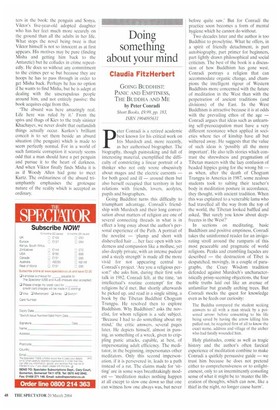Doing something about your mind
Claudia FitzHerbert
GOING BUDDHIST: PANIC AND EMPTINESS, THE BUDDHA AND ME by Peter Conradi Short Books, £9.99, pp. 183, ISBN 1904095631 peter Conradi is a retired academic best known for his critical work on Iris Murdoch and, more recently, as her authorised biographer. The biography, though painstaking and full of interesting material, exemplified the difficulty of constricting a linear portrait of a thinker who not only wrote obsessively about mages and the electric currents — for both good and ill — around them but also herself occupied that territory in her relations with friends, lovers, acolytes, pupils and biographers.
Going Buddhist turns this difficulty to triumphant advantage. Conradi's friendship with Murdoch and their long conversation about matters of religion are one of several connecting threads in what is in effect a long essay about the author's personal experience of the Path. A portrait of the novelist — 'plump and short with dishevelled hair ... her face open with tenderness and compassion like a mollusc, yet also deeply private, with an intense pudeur and a steely strength' is made all the more vivid for not appearing central to Conradi's project. 'Are you a religious person?' she asks him, during their first solo talk in 1982. Conradi felt, at the time, 'an intellectual's routine contempt' for the religions he'd met. But shortly afterwards he picked up, and read in a single sitting, a book by the Tibetan Buddhist Chogyarn Trungpa. He resolved then to explore Buddhism. Why Buddhism? asks the novelist, for whom religion is a safe subject. 'Because I had to do something about my mind,' the critic answers, several pages later. He depicts himself, almost in passing, as something of a wreck, given to crippling panic attacks, capable, at best, of impersonating adult efficiency. The meditator, in the beginning, impersonates other meditators. Only this second impersonation, if it is persevered in, leads to a path instead of a rut. The claims made for 'sitting' are in some ways breathtakingly modest — 'meditation makes nothing happen at all except to slow one down so that one can witness how one always was, but never
before quite saw.' But for Conradi the practice soon becomes a form of mental hygiene which he cannot do without.
Two decades later and the author is too Buddhist to proselytise. What he offers, in a spirit of friendly detachment, is part autobiography, part primer for beginners, part lightly drawn philosophical and social criticism, The best of the book is a discussion of how Buddhism has gone west. Conradi portrays a religion that can accommodate organic change, and champions the intelligent rigour of Western Buddhists more concerned with the future of meditation in the West than with the perpetration of ancient traditions (and divisions) of the East. In the West Buddhism is attractive because it is at odds with the prevailing ethos of the age — Conradi argues that ideas such as unlearning self-preoccupation must have a very different resonance when applied in societies where ties of kinship have all but withered away. He suggests that the value of such ideas is 'possibly all the more important'. He also tells stories which contrast the shrewdness and pragmatism of Tibetan masters with the lazy confusion of beaded hippies going for the wrong bit as when, after the death of Chogyam Trungpa in America in 1987, some zealous students took to salting their teacher's body in meditation posture in accordance, they thought, with ancient tradition. When this was explained to a venerable lama who had travelled all the way from the top of the world, the Tibetan looked baffled and asked, 'But surely you know about deepfreezes in the West?'
In sections on meditating, basic Buddhism and positive emptiness, Conradi takes the uninformed reader for an invigorating stroll around the ramparts of this most peaceable and pragmatic of world religions. Peaks and crumbling facades are described — the destruction of Tibet is despatched, movingly, in a couple of paragraphs, the Crazy Wisdom tradition defended against Murdoch's uncharacteristically prissy-seeming objections, the four noble truths laid out like an avenue of unfamiliar but grandly arching trees. But Conradi mocks the quest for knowledge even as he feeds our curiosity:
The Buddha compared the student seeking answers to all with a man struck by a poisoned arrow: before consenting to his life being saved by having the arrow killing him pulled out, he required first of all to know the exact name. address and village of the archer who had fatally wounded him.
Holy platitudes, comic as well as tragic history and the author's often farcical experience of meditation combine to make Conradi a quirkily persuasive guide — we trust him because he does not pretend either to comprehensiveness or to enlightenment, only to an intermittently consoling sense of what it might be to 'master the liberation of thoughts, which can now, like a thief in the night, no longer cause harm'.


















































































 Previous page
Previous page